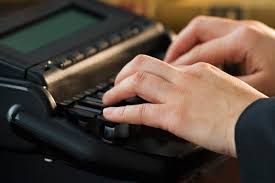Month: March 2019
Ten Things Court Reporters Want you to Know

When your court reporter arrives at your deposition, their
goal is to take down an accurate, verbatim record of the proceedings and
provide you with a timely transcript. There are some easy things you can do to help
your court reporter serve you.
1. Who are you? How
do you spell that name?
Either before you arrive at the deposition, or prior to the
deposition’s start, give your court reporter the full case caption, including
counsel for all parties. If there is a Notice of Deposition containing all of
that information (including contact information for all counsel), that is the
easiest way to communicate that information. Also, if you give your court
reporter the spellings of the proper names and technical terminology in the
case, they’ll be able to add those to their dictionary ahead of time. This is
especially helpful if you’ll be using a realtime court reporter.
2. Pause to mark
exhibits
Court reporters can’t mark exhibits and take down the record
at the same time. If you quickly hand the exhibit to the court reporter then
ask your question without skipping a beat, either the exhibit won’t get marked
right away or the reporter will miss part of your question. By pausing for a
few moments while the exhibit is marked, you can ensure that you’ll have an
accurate and complete record.
3. Communicate
expectations early and clearly
All depositions are different, which is why it’s important
to communicate specific needs that you may have before it begins. If you need a
realtime feed, be sure to request “realtime” on the online scheduling
form or when you are scheduling on the phone.Realtime reporters require special
certification, and not every court reporter is certified to provide realtime.Likewise,
if you need an interpreter, a rough draft, or otherwise expedited service, be
sure to communicate that at the time of booking, and, if expedited, give a
specific date and time that the transcript will be needed.
4. 7th Inning (or 3rd
Inning) Stretch
Taking quick breaks throughout an all-day depositions is a
good practice both for you AND your court reporter! In addition to allowing
everyone to rest and stretch, they’ll help you and your witness to refocus,
which could shorten the total deposition time. It also helps your court
reporter prevent repetitive stress injuries and prolongs their career.
5. Not too fast, not
too quiet
Be aware of how fast you’re speaking or if the witness is
mumbling or soft-spoken. Court reporters don’t like to interrupt your
deposition to ask for someone to slow down, speak up, or enunciate, so if you
pay close attention to these potential problems you can avoid interruptions.
Before the deposition, encourage your witnesses to speak loudly and clearly,
and to not cover their mouth with their hands.
6. Defuse arguments
Sometimes, depending on the nature of the litigation or the
relationship between the attorneys or parties, there is a potential for heated
arguments during a deposition. However, your interest should be in preserving a
good record. No matter how high emotions (or stress) are running, try to not
talk over anyone or allow shouting matches to break out during the deposition.
If necessary, take a short recess so the parties can compose themselves.
7. We’re neutral –
like Switzerland
Court reporters are neutral third parties, officials of the
court, and are not supposed to give, or even have, an opinion of how we think
your case is going. In reality, we only ever hear one side of the evidence, so
we wouldn’t make good judges anyway!
8. If we can hear it, it’s
going in the record
Beware: Everything that can be heard on the video will be transcribed.
Everything! So if you don’t want something to be on the record, either write it on
a piece of paper and hand it to your co-counsel or client, or say, “Off
the record.”
9. Finish your sentences.
Even if your point has been made in courtroom or in the
deposition, it may not be on the record. If you begin a question with “As if he
were…” or “Over the…” and leave the question hanging without finishing your
sentence, whoever is reading the transcript will be left to draw their own
conclusion as to what you meant.
10. “Let the record show.”
Everyone has mannerisms and speech patterns that they cannot
control. Some people talk with their hands, others nod, others say “yup” or
“uh-huh.” When attorneys speak like this in the courtroom or in
depositions, they often forget about these peculiarities, which can result in
an awkward situation for a court reporter. For instance, if an attorney asks
his client about a number on a piece of paper, and the client responds, “This,”
the record isn’t going to be very clear. An attorney should make every effort
to make sure all testimony is spoken. If it is not, a simple “let the record
show” can be used to clarify nods, gestures, and other unspoken responses.